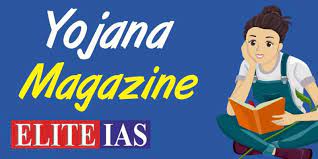Yojana Magazine is a monthly publication by the Government of India that focuses on socio-economic issues, policies, and programs. It aims to provide in-depth analysis and insights into various topics relevant to India's development and governance. Here are some key features you might expect to find in the magazine:
1.Theme-based articles: Each issue of Yojana Magazine typically revolves around a specific theme. The articles explore various dimensions of the theme, offering a comprehensive understanding of the topic.
2.Policy analysis: Yojana Magazine often provides analysis and evaluation of government policies and initiatives. It highlights their impact, implementation challenges, and potential outcomes.
3.Developmental issues: The magazine covers a wide range of developmental issues concerning India, such as education, healthcare, agriculture, infrastructure, rural development, skill development, and sustainable development.
4.Expert opinions: Yojana Magazine features articles written by subject-matter experts, policymakers, academicians, and practitioners who provide their perspectives and insights on the theme or issue being discussed.
5.Case studies and success stories: The magazine often includes case studies and success stories that highlight innovative projects, schemes, and best practices in different sectors. These examples serve as inspiration and provide valuable lessons for policymakers and administrators.
6.Interviews and interactions: Yojana Magazine may include interviews with influential personalities, policymakers, or experts who share their thoughts and experiences on relevant topics.
7.Statistics and data: The magazine incorporates statistical data, charts, and graphs to provide a factual understanding of the issues at hand. It helps readers visualize the trends and patterns associated with the topics being discussed.
8.Government initiatives: Yojana Magazine focuses on government initiatives, schemes, and programs, presenting an overview of their objectives, implementation strategies, and impact on the intended beneficiaries.
It's important to note that the content and features of each issue can vary depending on the specific theme and the editorial decisions made by the magazine's team. To get accurate and up-to-date information about the latest issue of Yojana Magazine, I would recommend visiting their official website, subscribing to the magazine, or contacting the publication directly.
Get more information please click here: https://www.eliteias.in/yojana-magazine/

Comments
Post a Comment